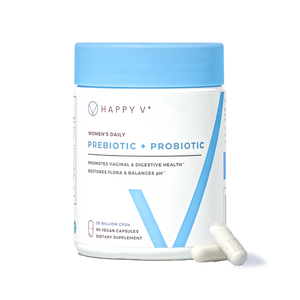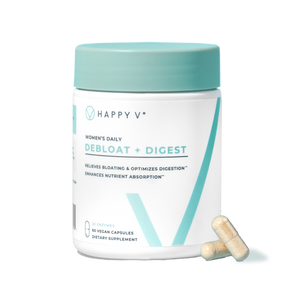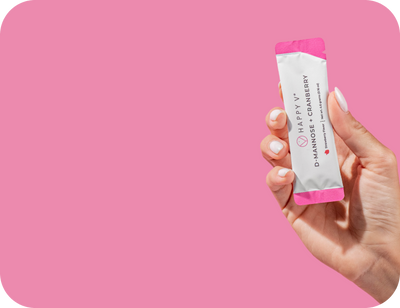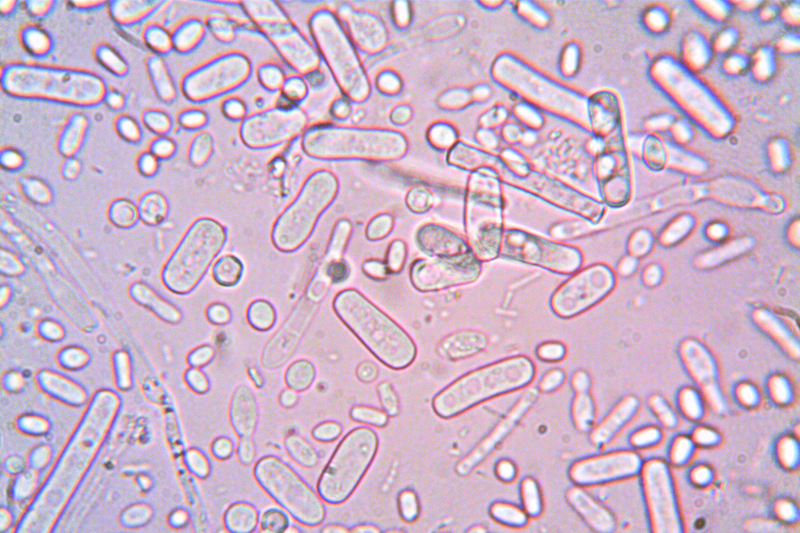- Fact Checked
- June 09, 2025
- 9 min read
What Is Lactobacillus, And Can It Help Treat BV?
Table of Contents
Table of Contents
When you think about bacteria, your first instinct might be to cringe, but not all bacteria are bad news. In fact, your body depends on billions of beneficial bacteria to function smoothly, especially in places like your digestive tract and vagina. And among these, the Lactobacillus is a real MVP1.
These naturally occurring microbes play a major role in everything from digesting food to defending against infections2. They do things like produce lactic acid to keep harmful microbes in check and help maintain a balanced, healthy environment, whether that’s your gut or your vaginal microbiome3. And when things go out of balance4, that’s when problems like bloating, bacterial vaginosis, or recurrent infections can crop up.
In this post, we’ll walk through what the Lactobacillus subspecies and the strains that belong to it actually are, how different strains support your well-being, and why scientists (and wellness experts) are so excited about its potential. Ready to meet your underappreciated, all-natural wellness ally? Let’s get into it.
This post is for informational purposes only and does not constitute medical advice. See full disclaimer below.
What Is Lactobacillus?
Lactobacillus is a group of beneficial bacteria (which scientists call the Lactobacillus genera) that lives in your gut, vagina, and other parts of our bodies, and keeps everything working as it should5.
Members of this genera, which are named by both their species and their specific strains, have been extensively studied because they help maintain a healthy balance of microorganisms and support your immune system, digestion, and vaginal health. And according to Dr. Jessica Younes, scientific director at the International Probiotics Association, some of these strains get upgraded to the title of probiotic.
“The strains that have a specific health benefit supported by scientific evidence are allowed to be called probiotics.”
In the vaginal microbiome, naturally occurring lactobacilli species act like a natural defense system6. “They are the main characters in the life of a healthy vagina,” says Dr. Younes. “If your vagina isn’t dominated by lactobacilli, you are generally more susceptible to infections.”
They produce lactic acid, which helps keep the vaginal environment slightly acidic, making it harder for bad microbes and pathogens to grow. When Lactobacillus levels are low, harmful bacteria like Gardnerella vaginalis spp. can take over, potentially leading to bacterial vaginosis7
You can boost your levels of good bacteria through your diet by eating foods like yogurt, kefir, sauerkraut, sourdough bread, kimchi, and other fermented foods, or your probiotic intake (aka those strains with specific, science-backed benefits) by taking a dietary supplement like a probiotic or a probiotic + prebiotic8.
Can Probiotics Help Treat BV?
The research is very, very promising! While antibiotics like metronidazole or clindamycin are often prescribed to treat BV, probiotics have been shown to be especially supportive for women experiencing recurring BV9.
That’s because probiotic supplements containing specific strains of Lactobacillus can help restore a healthy vaginal microbiome by:
- Reintroducing the “good” bacteria your body needs
- Reducing overgrowth of disruptive microbes
- Supporting your body’s immune system and natural defenses
In preclinical lab testing, Happy V’s Probiotic + Probiotic showed strong antimicrobial activity against Gardnerella vaginalis (aka the main bacteria behind BV). Our formula is designed to be gentle, effective, and backed by science, with no added sugars, fillers, or synthetic preservatives.
Strains That Make a Difference
Not all probiotics are created equal. Different species and strains of Lactobacillus have unique health benefits, and when it comes to vaginal and gastrointestinal support, a few stand out10:
Lactobacillus rhamnosus
This well-studied probiotic strain plays a key role in supporting both vaginal and gut health.
It helps restore the vaginal microbiota and pH, which may reduce symptoms of bacterial vaginosis (BV) and prevent recurrence11. L. rhamnosus spp. are also known to produce immune-supporting cytokines and thrive in acidic and slightly basic environments, making it particularly resilient in the gut.
It has shown benefits for inflammatory bowel conditions like irritable bowel disease (IBD) and irritable bowel syndrome (IBS) and may help prevent urinary tract infections. Happy V uses theclinically studied strain of L. rhamnosus (HN001) in our probiotic blend, designed specifically for women’s health.
Lactobacillus reuteri
Some L. reuteri spp. produce reuterin, a natural antimicrobial compound that helps deter harmful bacteria, yeasts, and other pathogens. Many L. reuteri strains also generate hydrogen peroxide (H₂O₂), another key defense molecule that helps inhibit pathogenic growth and maintain a healthy vaginal environment.
The probiotic strain in our formula, L. reuteri HR7™ contributes to a balanced vaginal pH and supports urogenital and gastrointestinal health. Like other strains in Happy V’s formulas, L. reuteri helps fortify your microbiomes from multiple angles.
Lactobacillus crispatus
A powerhouse strain commonly found in the vaginal microbiota of healthy women, Happy V’s L. crispatus CCFM1110™ produces high levels of lactic acid and hydrogen peroxide, compounds that help prevent bacterial overgrowth and maintain vaginal comfort12.
Research suggests it can reduce infections from harmful bacteria, including Chlamydia trachomatis, Candida albicans, and E. coli13. This species and its associated strains are cornerstones of a resilient vaginal ecosystem.
Lactobacillus acidophilus
L. acidophilus is one of the most abundant and essential probiotic species found in both the gut and vagina14. It helps prevent the growth of harmful microbes by producing lactic acid, hydrogen peroxide, and bacteriocins, while also crowding out pathogens by adhering to mucosal walls.
In one clinical study, the LA-14® strain (used in Happy V’s probiotic formula, btw) successfully colonized the vagina after oral supplementation with 8 billion CFUs per day. This strain may support symptoms of BV, promote vaginal moisture, help prevent UTIs, and improve gut-related conditions like IBD.
You’ll also find L. acidophilus in many fermented foods like yogurt, kimchi, sauerkraut, and kefir (though not Happy V’s specific, clinically studied strain).
Lactobacillus gasseri
Some L. gasseri spp. produce lactic acid and hydrogen peroxide (H₂O₂), compounds that naturally help deter harmful bacteria and maintain a balanced vaginal pH. This species is known for its strong ability to adhere to vaginal epithelial cells, forming a protective barrier that limits pathogen growth and supports a stable microbiome.
The probiotic strain in our formula, HLG13™, is selected for its resilience and ability to support both vaginal and gastrointestinal health.
Combining Proven Strains
Each of these proven Lactobacillus strains brings unique benefits, but when combined, they work smarter together to help maintain vaginal balance, protect against harmful bacteria, and strengthen the gut-vagina connection. When combined, they restore a healthy pH, create protective acids, and form a barrier that discourages infection-causing microbes from taking hold.
And that’s exactly why Happy V’s combines these proven strains in our Prebiotic + Probiotic formula. In a preclinical antimicrobial study, the strains in Happy V’s blend (combined with the prebiotic PreforPro®) were tested against 22 microorganisms linked to vaginal infections. The results showed that the probiotic mix inhibited the growth of key BV-associated bacteria, including Gardnerella vaginalis, one of the main culprits behind bacterial vaginosis. Even more important: while harmful bacteria were reduced, beneficial microbes remained unaffected, showing that the formula supports balance, not broad disruption.
Put simply, our probiotic strains don’t just vibe together, they squad up to help block bad bacteria, boost vaginal comfort, and keep your microbiome in its happy place.
Other Potential Benefits of Lactobacillus
While most people associate the Lactobacillus genus with gut health or managing bacterial vaginosis, its reach might extend even further15. Ongoing clinical trials and emerging studies suggest that these powerful probiotic bacteria may support a wide range of health conditions across different systems in the body.
Here are a few more health benefits researchers are currently exploring:
May Reduce Allergic Reactions
Some research indicates that taking certain Lactobacillus spp. during pregnancy or while breastfeeding may help prevent infants from developing eczema or asthma, both of which are linked to allergic reactions16. While more data is needed, early findings are promising.
Helps with Antibiotic-Associated Diarrhea
Antibiotics are known to disrupt the balance of good bacteria in the gastrointestinal tract, which can result in acute diarrhea17. Certain strains of Lactobacillus—especially when taken as supplements during or after a course of antibiotics—may help maintain the body’s natural microbiota and reduce the severity or duration of diarrhea in both adults and children18.
Supports Urinary Tract Health
In addition to vaginal health, Lactobacillus probiotics may help prevent recurring urinary tract infections19. By promoting a healthy vaginal and gut microbiome, these beneficial bacteria can help reduce the presence of uropathogens like E. coli and support overall urinary comfort.
May Lower Cholesterol
Lactic acid bacteria, including L. acidophilus, may help reduce dietary cholesterol absorption20. While the effect is generally mild, it contributes to a heart-healthier profile when combined with other lifestyle changes.
May Help Manage Inflammatory Bowel Disease
Because inflammatory bowel disease (IBD) is closely linked to gut inflammation, maintaining a healthy microbiome is key. Some strains of probiotic Lactobacillus spp supplements show promise in reducing inflammation and improving well-being for individuals with IBD symptoms21.
Still Being Studied: Constipation, Cold Symptoms & Abdominal Pain
Preliminary research suggests Lactobacillus spp. might help manage constipation, abdominal pain (especially in children), and even reduce the frequency of the common cold22. These are exciting areas of study, but more robust data is needed before firm conclusions can be drawn.
Are There Any Side Effects?
Most people tolerate probiotic supplements well. You might notice mild gastrointestinal effects like gas or bloating during the first few days. Typically, that’s just your microbiome adjusting. If you have a weakened immune system or a chronic health condition, it’s always a good idea to speak with your healthcare provider before starting a new supplement.
Final Thoughts
Lactobacillus isn’t just a buzzword. It’s a natural way to level up your wellness routine through science. For women dealing with bacterial vaginosis, incorporating probiotics with the right species/strains, right mechanism of action, and the right dose of Lactobacillus spp. can support vaginal balance and reduce the risk of recurring infections.
Happy V’s Vaginal Health Probiotic combines clinically proven strains of L. rhamnosus, L. reuteri, L. crispatus, and L. acidophilus in a doctor-formulated blend, with no unnecessary extras. And with preclinical data showing action against Gardnerella vaginalis, it’s more than just a probiotic, it’s part of your long-term BV support strategy.
Keep the Conversation Going
- Visit our blog for more on BV treatment options and women’s health tips.
- Join our private Happy V Facebook group to hear from others who’ve been there.
- Explore supplements designed to support your vaginal health journey.
Disclaimer: This blog is for informational and educational purposes only and is not intended to diagnose, treat, cure, or prevent any disease. Statements about supplements have not been evaluated by the Food and Drug Administration. For more information about vaginal infections, visit the CDC or speak to a licensed healthcare provider.














